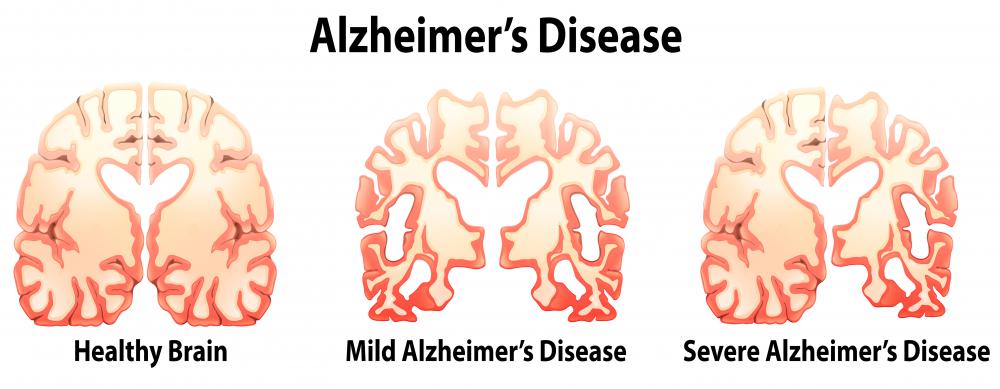At TheHealthBoard, we're committed to delivering accurate, trustworthy information. Our expert-authored content is rigorously fact-checked and sourced from credible authorities. Discover how we uphold the highest standards in providing you with reliable knowledge.
What is the Basal Forebrain?
The basal forebrain consists of a group of regions in the lower, or basal, area of the brain. Although its functions are not well understood, it is important as a producer of the neurotransmitter acetylcholine. It is known to have an effect on attention, reflexes and learning. Degeneration in the basal forebrain is associated with Alzheimer's disease.
There is not a good deal of agreement about exactly which regions make up the basal forebrain. This is partly because these areas share transmitters and connectors with other parts of the brain and partly because their physical boundaries are unclear — their neurons might spread out and share space with other brain structures. The basal forebrain largely consists of the area that was once known as the substantia innominata, or "the region without a name," because its function was a mystery. It is made up of three areas — the basal nucleus, the extended amygdala and the ventral striatopallidum — although each of the three contains smaller subregions.

There have been advances in the understanding of what purposes the areas of the basal forebrain serve. The acetylcholine it produces increases attention and enables conscious awareness. Most of the brain's acetylcholine is produced here in the basal nucleus. This high concentration of cholinergic cells, or acetylcholine-containing cells, is seen as a specialization that marks a difference between primates and lower forms of life. Animals such as rats lack this specialized cholinergic pathway and instead produce acetylcholine in their cerebral cortexes.

This cholinergic system has some connection to anxiety. It is able to activate a defensive response to a loud sound, which allows one to act more quickly than if the information had to be processed in the cerebral cortex. Basal forebrain neurons are also involved in motor control and temperature regulation.
The basal forebrain has been shown to connect with the brain's goal and reward centers in learning and the formation of memory. One of its subregions, the nucleus accumbens, is well known as a reward center and is believed to be responsible for the release of the neurotransmitter dopamine, which produces drug euphoria. The nucleus accumbens is also involved in the withdrawal effects of drugs. Researchers have investigated the connections between this region and addictive behavior.

This cholinergic system is believed to be important in enabling the brain to recover from injury. Lesions to this area are connected with memory loss. Damage to this area, or a deficiency of acetylcholine, is seen in patients who have Alzheimer's disease.
AS FEATURED ON:
AS FEATURED ON:














Discuss this Article
Post your comments